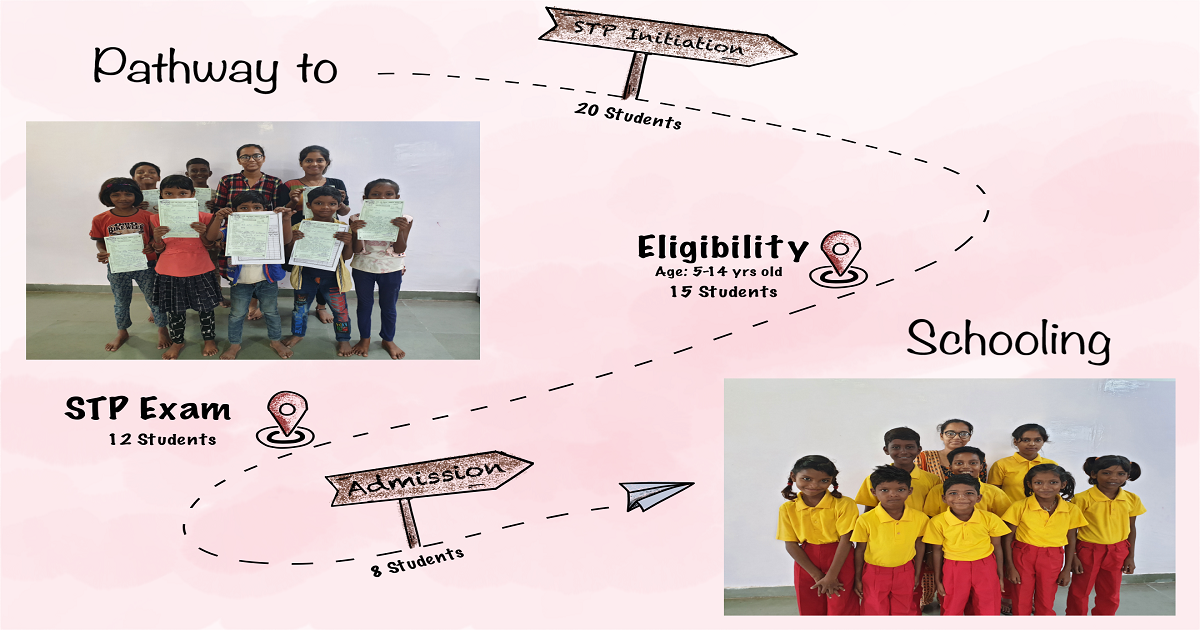STORY CREDITS
Writer/Editor: Shivangi Vasudev Bhatt
Photo: Media and Communication, IIT Gandhinagar
Here’s what you need to know about the Pathway Programme to Regular Schooling.
The Pathway Programme to Regular Schooling (PPRS) was started by our former students Anukesh K A, Krishna T, and Jophy Joseph with an aim to admit children studying in Nyasa school to formal school. The lack of affiliation of Nyasa with any local government body was a major hurdle, and the migrating workers could not admit their children to regular schools once they left IIT Gandhinagar.
Considering the challenges faced by the migrating workers, Nyasa conducted a “Special Training Programme” (STP), a part of PPRS, in collaboration with the Basan Primary School in 2021-22. The principal of Basan Primary School, Mr Sunil Patel, was very welcoming and guided the team through the whole process of STP. Out of the 20 children, 15 were found eligible for STP, and of these, 12 completed the programme with education being provided by Ms Solanki Falgunibahen, Nyasa teacher, and one of the government teachers at the school. However, the continuation of education at the Basan Primary School faced challenges as teaching was happening in the Gujarati language, and the kids struggled to grasp it. To make things work out, the Basan Primary School issued transfer certificates to help these children to join other Hindi or English medium schools. Out of the 12 children, four of them migrated, and eight opted to continue their education, and since the nearby Government schools are all Gujarati medium, the Nyasa team ventured out to find a suitable school for the continuation of their education. The Principal of Colonel’s Heritage School (English medium) at Chiloda, Gandhinagar, Mr Lalith Agrawal, was gracious to accommodate students at an annual fee of Rs 14,000 per child, including uniforms, transportation, books, and snacks. Willing to lend a helping hand, the Campus Development Office at IITGN joined this initiative to reduce the financial load on the parents of these children.
This is no minor feat, and the team extend its heartfelt gratitude to Prof Amit Prashant, Prof Gaurav Srivastava, Prof Sharada C. V., Mr Dipakkumar Lalpura, Ms Meena Joshi, Mr Rajendra Vaishnav, Ms Sudarshini Jain, and all the people who have supported them to achieve this milestone.
About Nyasa
Nyasa, an informal school started by faculty and student volunteers of IITGN in 2011, primarily aims to support and provide educational opportunities to the children of migrant construction workers in and around the campus. Nyasa volunteers, i.e. students and community members of IITGN, teach these children basic alphabets, script, rhymes, songs and arithmetic. They also engage them with music, origami sessions, computer sessions, regular sports sessions, cultural and fun events, periodic health camps, etc. There are also two full-time teachers for these children. Construction workers’ children are also aided with enrolment in regular government schools. The IITGN community offers financial help to students interested in pursuing formal education.
The Institute community’s collective strength in ‘education’ is used as a platform to bring the children from dusty environs to an informal school, provide them mid-day meals, fruits for good health, and basic education on our campus. Various things like clothes, uniforms, books, stationery, bags, footwear, etc., are distributed from time to time. The focus is on the overall development of the children to make them confident human beings so that they can live up to their potential.

